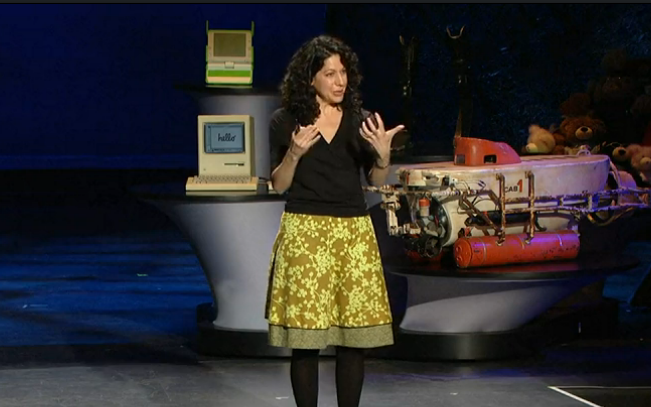So we went back to molecular biology and started studying different bacteria,
所以我们回到分子生物学的方法,开始研究不同的细菌,
and what we've found now is that in fact, bacteria are multilingual.
我们现在已经发现,事实上,细菌可以讲多国种语言。
They all have a species-specific system -- they have a molecule that says "me."
它们都有一个菌种特别识别系统,用特别分子来辨别同类。
But then, running in parallel to that is a second system that we've discovered, that's generic.
但是,我们发现,它们同时还有另一种系统,那是一个通用的系统。
So, they have a second enzyme that makes a second signal and it has its own receptor, and this molecule is the trade language of bacteria.
因此,它们有另一种催化剂,能产生第二种信号,这种信号也有自己的受体,这种分子是细菌们的公共语言。
It's used by all different bacteria and it's the language of interspecies communication.
它被所有不同的细菌所公共使用,是一种菌种间沟通的语言。
What happens is that bacteria are able to count how many of me and how many of you. They take that information inside,
细菌能够计算并区分自己周围同种与异种细菌的数量。它们传递这些讯息到细胞内,
and they decide what tasks to carry out depending on who's in the minority and who's in the majority of any given population.
然后决定该怎么做,它们的行动取决于在整个群体中谁占多数,谁占少数。
Then again we turn to chemistry, and we figured out what this generic molecule is -- that was the pink ovals on my last slide, this is it.
我们又使用化学方法搞清了这个通用分子的构造--通用分子就是我上一张幻灯的粉红色椭圆形。

It's a very small, five-carbon molecule.
它是一个非常小的五碳分子。
What the important thing is that we learned is that every bacterium has exactly the same enzyme and makes exactly the same molecule.
重要的是,我们发现每种细菌都有完全一样的催化剂,可以制造一模一样的分子。
So they're all using this molecule for interspecies communication. This is the bacterial Esperanto.
它们都使用这个分子作为菌种间交流的语言。这是细菌的世界语。
Once we got that far, we started to learn that bacteria can talk to each other with this chemical language.
一旦我们了解这个后,我们知道细菌可以用这个分子来相互交流。
But what we started to think is that maybe there is something practical that we can do here as well.
但是我们又开始思考,也许我们可以使用这个发现来做一些实质上的应用。
I've told you that bacteria do have all these social behaviors, they communicate with these molecules.
我已经告诉过你们,细菌间是有社交行为的,它们是使用这些分子进行交流的。
Of course, I've also told you that one of the important things they do is to initiate pathogenicity using quorum sensing.
当然,我也告诉过你,其中一件主要的事情就是它们使用聚量感应来启动致病性。
We thought, what if we made these bacteria so they can't talk or they can't hear? Couldn't these be new kinds of antibiotics?
我们不禁想,我们是不是可以让这些细菌哑了或聋了?这岂不是可以成为一种新的抗生素?












